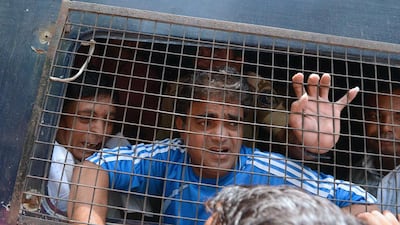NEW DELHI // A special court in India on Thursday convicted 24 Hindu men of involvement in a series of anti-Muslim riots that killed 1,000 people in Ahmedabad 14 years ago.
Eleven were found guilty of murder at the Gulberg Society in Ahmedabad, while the others were convicted of serious charges including arson and looting. They will be sentenced on Monday.
Thirty-six people – including Bipin Patel, a local official and member of India’s ruling Bharatiya Janata Party (BJP) – were acquitted for lack of evidence. The widow of a victim said she would appeal against the acquittals.
The riots took place over several weeks in 2002 after a railway carriage full of Hindus was torched in the town of Godhra, killing 59 people.
The next day, a crowd of about 20,000 gathered outside Gulberg Society, an Ahmedabad housing complex of 29 bungalows and 10 apartments.
Sixty-nine residents lost their lives in Gulberg Society, many of them burnt to death. Among them was Ehsan Jafri, a former Congress Party member of parliament, who was hacked with swords and machetes then set on fire.
It was the second largest number of Muslim killings in a single incident, after another riot in Naroda Patiya, a suburb of Ahmedabad in which 97 Muslims died.
Hindus also rampaged through other towns in Gujarat leaving at least 1,000 dead in all, most of them Muslims.
The mob appeared to be well-organised. Witnesses told investigators that the attackers went through the housing complex in a methodical fashion, using lists of voters’ names and addresses to identify poperties occupied by Muslims.
Many among the attackers are believed to have been members of right-wing groups such as Rashtriya Swayamsevak (RSS) and Vishwa Hindu Perishad (VHP), which both have ideological links to the BJP.
Local VHP leader Atul Vaidya was among those who were pronounced guilty on Thursday, although he escaped a conviction for murder.
The Gujarat government was accused of failing to act against the mob and abetting it.
The widow of Jafri, Zakia, has claimed that her husband called police and government officials repeatedly for protection while the mob gathered, but that no help arrived.
The chief minister of Gujarat at the time was Narendra Modi, now India’s prime minister, who has also been accused of doing too little to halt the massacre.
But in Thursday’s verdict, judge PB Desai ruled there had been no conspiracy in the attack on Gulberg Society.
On Thursday, Ms Jafri said she was disappointed with the verdict of the special court.
“I will appeal against the verdict,” she said. “It is sad that 36 people have been let off.”
In 2008, the supreme court ordered the formation of an investigation team to probe the Gulberg Society massacre as well as several others. Based on the findings of that investigating team, a judge convicted 32 people of murder and criminal conspiracy.
They included Babu Bajrangi, a VHP leader, and Maya Kodnani, a former minister in Mr Modi’s cabinet in Gujarat, who was described as “the kingpin of the violence”.
The judge, however, ruled out any complicity by Mr Modi in the murder of Ehsan Jafri.
R K Raghavan, a former director of the Central Bureau of Intelligence and the head of the investigation team that probed the Gulberg Society massacre, said that his report had pressed for a charge of criminal conspiracy.
“But the court decided otherwise,” he said. “There is a kind of mixed feeling over the conviction. I am slightly disappointed over acquittals. That’s part of the game ... I’ll take it in my stride.”
Teesta Setalvad, an activist who has helped compile witness accounts and filed legal briefs on behalf of victims in the Gulberg Society case, pointed out that it was odd for one court to find evidence of criminal conspiracy in Naroda Patiya but another to find no such evidence in Gulberg Society, which is only a couple of kilometres away.
“We believe there was enough evidence that was laid down,” she said. “The eye witness accounts and the documentary evidence suggest wider conspiracy.”
Yesterday’s verdict can still be appealed in the Gujarat high court and then the supreme court.
Ms Setalvad said, “We are not about to give up the struggle right now.”
A separate case, filed by Ms Jafri, is attempting to link nearly 300 incidents of murder during the riots and accuses Mr Modi’s administration of criminal culpability in the violence.
This case is mired in the pre-prosecution stage in the Gujarat high court, since judges have not as yet issued a full list of charges against those accused of crimes.
ssubramanian@thenational.ae

